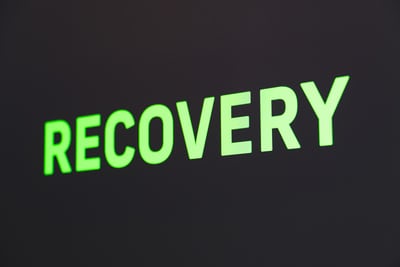When you’ve been dropkicked into grief, you’re usually stunned by the intense pain—the fear, the deep heartache, the feeling that all your insides have been ripped out and you’re bleeding internally. And one of the first questions going through your mind is:
How am I going to survive this?
Because acute grief leads you to believe that what you’re experiencing isn’t survivable.
I think what we’re really asking ourselves, though, is: How, exactly, does one grieve? What does the grief process look like? How do I know if I’m doing this right? How do I do it right?
Will I ever recover?
While there’s still a debate on whether or not someone truly recovers from grief (based on the pure definition of “recovery”), there are steps we can take to complete our intense grieving, and heal so we can return to a normal, fulfilling life after a loss.
It is the process or path to grief completion that can help us get there.

What is grief completion?
When we complete something, we bring it to a close or conclusion. A wrap-up. If we understand that grief is an emotion—often intense, overwhelming and paralyzing—we can better understand that grief is a valley we can and should walk through with a goal to arrive on the other side, into a brighter day.
According to the Grief Recovery Institute, their definition of [grief] completion is:
“Completion is the action of discovering and communicating, directly or indirectly, the undelivered emotions that attach to any relationship that changes or ends.”
Examine that definition closely and pull it apart to understand each intricate part.
- Completion is an action. It requires the griever to do something for herself; to be an active participant.
- Completion is an act of discovery, which implies uncovering hidden truths or tangible items. Bringing into the light what was once hidden from sight or recognition.
- Completion is communicating, verbalizing what was once unspoken or unexpressed.
- Completion uncovers or sheds light on emotions that have not previously been acknowledged or expressed.
Grief completion is the process you go through. It’s where you dig deeply into your heart and memory banks to find and expose those emotions that naturally accompany any relationship. The emotions you buried or were lying dormant.
The emotions that brought you joy.
The emotions that brought you pain.
The emotions you felt guilty for having.
The emotions you wanted to express, but, for whatever reason, you didn’t or couldn’t.
Death, divorce, friendship loss, job loss, pet loss, moving, and other “loss” all bring with them emotional upheavals that often don’t get addressed adequately. Emotions over things that did happen. Emotions over things that didn’t.
Those deeply buried, undelivered emotions are the components of grief that can leave us stuck in our healing process.

Can you “recover” from grief?
When we’re grieving, we wonder if we’ll ever be able to enjoy life again. We wonder if things will ever get any better.
As I asked above: Will we recover?
The answer, I believe, is yes—and no.
If you will allow me to use a physical injury as my first example, I’ll explain.
When an athlete was injured, my first responsibility was to determine the exact injury and its degree, or seriousness. Knowing the degree determined how I approached treatment and prescribed steps to adequate healing. Depending upon the tissue injured—skin, bone, soft tissue, nerve, etc.—a mild injury usually healed well and completely within two to six weeks, maybe sooner. IF the athlete followed treatment and recovery protocol.
For more serious injuries, more time and more complex treatment would be ordered, and the athlete’s condition and adherence to treatment played a big role in how that recovery went. Some athletes required surgery, which made full recovery even more complex. And sometimes impossible.
Yes, impossible.
When I fractured my leg during a championship meet, it was a complex fracture requiring careful treatment. Unfortunately, the doctors caring for me didn’t do the best job devising an adequate treatment plan. Surgery was offered, which I accepted. And then the doctor said he didn’t want to do surgery, and cited numerous reasons why. One doctor said he’d never seen a fracture like that before and didn’t know what to do. So they casted me for six weeks and then set up a treatment regimen.
I followed their treatment protocol, which wasn’t too specific, outside wearing my cast and staying on my crutches. And then some basic rehab, which involved whirlpool range of motion exercises. But that, it turns out, wasn’t adequate treatment for my type of fracture—one that was eventually written up in a journal for its oddity and difficulty treating.
Fast forward 43 years and 7 re-fractures later, and I’m still having difficulty with my right leg. The bone never healed straight enough, and I now have a leg length difference between my right and left leg due to the angle my leg takes when I walk.
If I go strictly by the definition of “recovery”—“to return to a normal state of health, mind or strength,” I would have to say I have not fully recovered from that injury. Not counting the age factor, I can’t do the things I used to do. I couldn’t do them right after the injury. And I could never return to doing them because of it.
Life is different.
The initial pain was so gut wrenching I would have been happy to be put out of my misery. Put down like some damaged racehorse. But eventually things got better, and the pain wasn’t as acute. And I am able to do a lot of physical activity, for which I’m grateful.
But all these years later, my brain is sometimes teased by regrets, and what used to be. And maybe what could have been. Especially when I have to think twice or three times about whether or not I should attempt a certain ski run, or hang up my downhill skis and turn exclusively to cross-country skiing now. And those thoughts sometimes trigger strong emotions, regrets and grief. It’s funny what can trigger grief’s return.
But now it’s not as gut-level painful. Instead, memories trigger a dull regret or sadness.
And it’s much the same when I think about our daughter, Victoria, and her death.
I thought the initial grief pain would kill me. Sometimes I hoped it would. But as I traversed the grieving process, the visceral pain and heartache became less intense. Twenty-seven years later the sadness still lingers, but I’m no longer living in it moment-by-moment.
Did life return to a state of normal for me? No. Life is different. Much different than it would be if our precious girl had survived.
But I’ve completed my grieving. I’m no longer suffering that deep anguish and fear. I’ve returned to a full life of joy and purpose.
And that’s the point and goal of grief completion.

What to do with those unfinished or undelivered emotions?
These unfinished emotions are often what cause us the most anguish. The thoughts of “what if.” The words left unspoken; the planned events cancelled. The holidays where someone is missing. The interactions that will never take place.
As much as we hope or intend to, it’s nearly impossible for our relationships or circumstances to end without those relationships containing some unfinished or undelivered emotions. Because our thoughts, opinions, and feelings about people and things change so often, our relationships are prone to constant minor and major shifts.
And because we can’t erase our emotional memories, we relive emotions—happy, warm or regretful—about an event or person throughout our lives. Indeed, grief can be re-triggered by dates, anniversaries, general event and location memories. Special music.
But there is a way to uncover those emotions, bring them into the light and understand them better. Confront them and take active action steps toward healing.
And one of the first things you can do is a relationship review.

What is a relationship review?
A relationship review often happens automatically after a loss. Have you ever sat around at a memorial luncheon, reminiscing about the person you’re honoring? Telling funny stories. Sharing memories.
That’s a basic relationship review. You’re sharing thoughts about the person’s relationship and interactions with you, and others are sharing their relationship to them. It helps keep the person’s memory alive and helps you advance into the grief completion process.
But you can, and should, go deeper with this process.
And that’s what we’ll delve into next week. How a relationship review can help us uncover the things we wished had been different. The things we wished had been better, the things we wished we could have enjoyed more of.
Discovering those wishes and thoughts can help us complete was is emotionally unfinished.
It’s all about small and correct action choices a grieving person takes to heal. Without them, we risk stunting our grieving and growth.
So let’s not think of grief recovery as getting to a time where we don’t remember our loved ones and never feel remorse over their death or estrangement from us, over no longer sharing life with them.
While the acute mourning eventually subsides, the memories and occasional melancholy linger.
And that’s okay.
Sigmund Freud had something to say about how the death of a loved one affects us.
“Although we know that after such a loss the acute state of mourning will subside, we also know we shall remain inconsolable and will never find a substitute. No matter what may fill the gap, even if it be filled completely, it nevertheless remains something else. And actually that is how it should be. It is the only way of perpetuating that love which we do not want to relinquish.” Letter from Sigmund Freud to Ludwig Binswanger, April 11, 1929

Invitation—
If you’re in the midst of grief, or if you feel as though you haven’t fully completed a grieving process, I invite you to ask yourself the following questions about the emotions you’re experiencing from your loss and maybe jot them down. We’ll use them in future sessions.
- What emotions that came along with the loss brought/bring you joy?
- What emotions brought/bring you pain?
- What emotions did/do you feel guilty for having?
- What emotions did you want to express, but, for whatever reason, you didn’t or couldn’t?
NEXT WEEK we’ll explore more of what a relationship review entails and the questions to ask yourself in prompting a review to uncover all that emotional energy behind grieving.
Until then, be safe, be kind to yourself and others, and don’t be afraid to lean into your grieving.
Blessings,
Andrea
“Beloved, I pray that you prosper in all things and be in health, just as your soul prospers” (3 John).
Andrea Arthur Owan, M.S., A.T., R., is a fitness pro, award-winning inspirational writer and senior-ordained chaplain (IFOC). She helps people recover from grief, loss and trauma, and to thrive — physically, emotionally, and spiritually.
